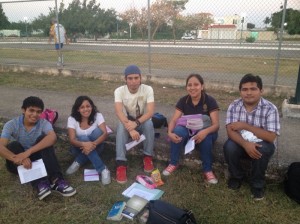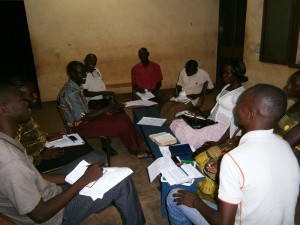Listen to the testimony of one of the student participants in the FCSI Israel Bible Study Conference:
“Last year, I faced the most difficult circumstance in my life – the loss of my mother after a long battle with cancer. She was my best friend, my role model, my source of support and the greatest blessing God has ever given to me. I could not imagine my life without her. When I went to the conference, she had stopped responding to treatments and her condition was deteriorating very fast. At this Bible study conference, we studied the story of Jesus calming the storm; through it, Jesus met my paralyzing fears, sorrow, and brokenness and calmed the raging storms within me. His strong presence and overwhelming peace embraced me, carried me above this crushing situation and helped me overcome what seemed to me insurmountable.”
 Our vision for the Mark Manuscript Bible Study Conference started in 2014; we wanted to see students who are both passionate about the Word and who know how to study and engage the Scriptures. We wanted students to meet Jesus through his Word and be transformed from within. Yet, the reality showed that our students were lacking the tools to study the Bible as individuals and with one another. So our desire was to offer them a study method which can help them feel comfortable studying the Bible with their friends and within their student groups. We believed that through this our students would also have the courage to start inviting their non-Christian friends to study the bible with them, offering them the chance to meet Jesus in his Word.
Our vision for the Mark Manuscript Bible Study Conference started in 2014; we wanted to see students who are both passionate about the Word and who know how to study and engage the Scriptures. We wanted students to meet Jesus through his Word and be transformed from within. Yet, the reality showed that our students were lacking the tools to study the Bible as individuals and with one another. So our desire was to offer them a study method which can help them feel comfortable studying the Bible with their friends and within their student groups. We believed that through this our students would also have the courage to start inviting their non-Christian friends to study the bible with them, offering them the chance to meet Jesus in his Word.
As we look back at these beginnings, we are filled with gratitude and joy to see God’s vision for the Christian students in Israel unfold. When we first invited students to meet Jesus through the book of Mark at this conference, less than 20 students committed to joining us. This year we had the third consecutive annual conference – for the first time, we had 110 participants altogether! Students have been sharing how this conference has shaped their faith and given them new eyes to see Scripture. More and more students are reading the Bible, leading to noticeable change in their personal lives.
Our prayer is to see the love of the Scripture and the passion we are witnessing among our students influencing the body of Christ in Israel.
Rasha Saba, rasha@fcsi.ws
Arab students’ ministry and training coordinator FCSI Israel


 The Italian context in which I live is characterized by suspicion and skepticism. It surprises me that in this context more seekers than I would have expected are curious to study Bible passages in a safe place with other fellow seekers. And when they come, oh, it is fascinating to see their reactions: “My first impression was shocking: I discovered in the Bible a marvelous figure, so human when angry and indignant in the face of unbelief and hypocrisy, and so divine in speaking with an authority never seen before… and even able to forgive his persecutors!’” says Gianluca, a medicine student.
The Italian context in which I live is characterized by suspicion and skepticism. It surprises me that in this context more seekers than I would have expected are curious to study Bible passages in a safe place with other fellow seekers. And when they come, oh, it is fascinating to see their reactions: “My first impression was shocking: I discovered in the Bible a marvelous figure, so human when angry and indignant in the face of unbelief and hypocrisy, and so divine in speaking with an authority never seen before… and even able to forgive his persecutors!’” says Gianluca, a medicine student.
 Along with it, a special “Uncover” edition of Luke’s gospel was published. It encourages seekers to go beyond reading just the passages which are included in the Bible study booklet to discovering the whole story of Jesus. This gospel edition includes
Along with it, a special “Uncover” edition of Luke’s gospel was published. It encourages seekers to go beyond reading just the passages which are included in the Bible study booklet to discovering the whole story of Jesus. This gospel edition includes  themselves into the passage, the Word comes alive to them, touches their own lives, and changes their approach to understanding God’s Word. To be a little bit more creative, acting can also be added in as the students speak scripture. However, the facilitator needs to see whether this will distract or help, as it can sometimes be a hindrance.
themselves into the passage, the Word comes alive to them, touches their own lives, and changes their approach to understanding God’s Word. To be a little bit more creative, acting can also be added in as the students speak scripture. However, the facilitator needs to see whether this will distract or help, as it can sometimes be a hindrance.

 Youl Juliette attended the event in Koudougou: “I learnt a lot from this night. I used to often read the Bible in a superficial way, but the different methods used during this night allowed me to ask questions of the text and understand it better.”
Youl Juliette attended the event in Koudougou: “I learnt a lot from this night. I used to often read the Bible in a superficial way, but the different methods used during this night allowed me to ask questions of the text and understand it better.”